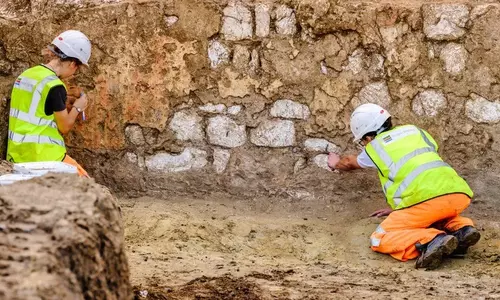

Holding cell for gladiators found at Roman site.
<p>
Excavations carried out by English Heritage archaeologists at the site of southeast England&rsquo;s Richborough Roman Amphitheater have unearthed a cell where gladiators, prisoners, and wild animals may have been held before performances and executions, according to a BBC report.</p>
<p>
Animal bones, coins, and pottery in the area suggest the Roman town was inhabited until the end of the Roman occupation of Britain in the fourth century.</p>
<p>
As many as 5,000 spectators could be seated in the chalk and turf amphitheater, thought to have been built in the first century A.D. Traces of paint indicate the structure was painted red and blue. The skeleton of a cat, named &ldquo;Maxipus&rdquo; by the researchers, was buried on the edge of a ditch outside the amphitheater.</p>
<p>
The find comes 172 years after Richborough Roman Amphitheatre, near Sandwich, Kent, was first uncovered.</p>
<p>
The discoveries have provided further evidence that Richborough was one of Roman Britain&#39;s most important sites, the<em> BBC</em> report said.</p>
The India-UK Free Trade Agreement, signed by Prime Minister Narendra Modi and UK Prime Minister…
The Ministry of Health and Family Welfare has achieved a major milestone in women's health,…
Chief of Army Staff General Upendra Dwivedi on Saturday addressed the Kargil Vijay Diwas celebrations…
Chief of Defence Staff General Anil Chauhan on Saturday paid heartfelt tribute to the brave…
Israeli Prime Minister Benjamin Netanyahu on Friday said that Israel and the United States are…
Both Cambodia and Thailand have written to the United Nations Security Council (UNSC) following two…